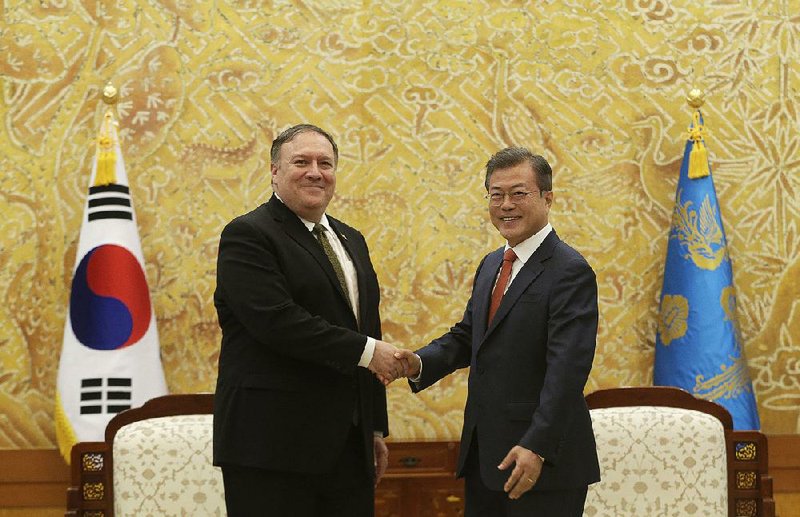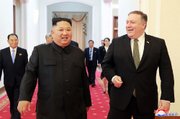SEOUL, South Korea -- Secretary of State Mike Pompeo said that he and North Korean leader Kim Jong Un made unspecified progress Sunday toward an agreement for the North to give up its nuclear weapons, though there was no immediate indication whether Pompeo had managed to arrange a much-anticipated second summit between Kim and President Donald Trump.
Trump, tweeting from Washington, cited progress on agreements he made with Kim at their June meeting in Singapore and said, "I look forward to seeing Chairman Kim again, in the near future."
North Korea's state-run Korean Central News Agency said Kim had "expressed his will and conviction that a great progress would surely be made in solving the issues of utmost concern of the world and in attaining the goal set forth at the last talks with the projected second DPRK-U.S. summit talks as an occasion." DPRK is the acronym for the country's official name: Democratic People's Republic of Korea.
In a dispatch early today, the news agency called the talks "productive and wonderful" and said that "mutual stands were fully understood and opinions exchanged."
Arriving in Seoul after several hours in Pyongyang on his fourth visit to North Korea, Pompeo said Sunday that he had a "good trip" and that he and Kim "continue to make progress on agreements made at the Singapore summit."
Pompeo said that in his meeting with Kim, the leader of North Korea had agreed to allow inspectors into a key nuclear testing site that the North has claimed it blew up, a down payment on the country's commitment to denuclearize.
Upon landing in South Korea, the top U.S. diplomat briefed White House national security adviser John Bolton and Trump chief of staff John Kelly on his trip, officials said.
Pompeo then met South Korea's president, Moon Jae-in. Moon, who has met twice with Kim, asked Pompeo to make public as much information as he could about the trip.
"I dearly hope that your latest visit, as well as the upcoming U.S.-North Korea summit, which I hope will be happening soon, will make an irreversible, decisive progress in terms of the denuclearization as well as the peace process," Moon said. "Since we have the media present here, I would like to ask you to disclose anything that you can open to the public here."
Pompeo declined that opportunity.
"I will certainly tell you in private about our conversation, but we had a good, productive conversation," Pompeo said. "As President Trump said, there are many steps along the way and we took one of them today. It was another step forward. So this is, I think, a good outcome for all of us."
Moon's office said in a statement later that Pompeo told Moon that the North Korean leader had agreed a second summit with Trump "should be held as soon as possible," and that talks on the timing and location would continue.
The two men discussed "the upcoming second summit" between Trump and Kim, refining options for the time and place of the next meeting between the two leaders, said Heather Nauert, a State Department spokesman. But no date or place was announced.
On Sunday, Pompeo said nothing about making significant breakthroughs, except for the North's agreement to allow inspectors into Punggye Ri, a network of underground tunnels where the North has conducted all of its nuclear tests, including one last November that it claimed was a successful test of a hydrogen bomb.
Missing from Pompeo's account of his two-hour meeting with Kim, which was followed by a 90-minute lunch, was any mention of the first step toward denuclearization: an inventory from the North of all its nuclear weapons, its production and storage sites, its missiles and missile launchers.
The United States has said that list would form the basis of determining whether the North was being truthful -- Washington has compiled its own list, based on intelligence sources -- and to set a schedule for dismantlement.
The North has dismissed that call as an effort by the United States to collect a list of potential targets should it seek to attack Pyongyang's nuclear facilities. It has demanded starting with a peace declaration, formally ending the Korean War.
The inspections of the nuclear site could be significant, if they go ahead. North Korea blew up the tunnels at Punggye Ri in late May, inviting cameras to witness the explosion. But the pictures did not make clear whether the destruction was limited to the tunnel entrances, which could be cleared later, or included the tunnels themselves, where the nuclear tests occur.
The statement from the State Department did not say who would conduct the inspections. The International Atomic Energy Agency, the United Nations' nuclear watchdog, takes inventory of nuclear fuel and fuel-producing equipment, but does not usually deal with nuclear weapons or test sites.
LUNCH WITH KIM
In Pyongyang, Pompeo and Kim's business session was followed by a 90-minute luncheon that the North Korean leader hosted at a state guesthouse, according to the pool report from the lone U.S. journalist allowed to accompany Pompeo on his Asia trip.
"It's a very nice day that promises a good future for both countries," Kim told Pompeo through an interpreter as they sat down for the meal.
"Yeah, so we had a great, great visit this morning," Pompeo replied. "Thank you for hosting, President Trump sends his regards. And we had a very successful morning so thank you, and I am looking forward to our time here at lunch as well."
On the North Korean side, Kim was joined at the lunch by his sister, Kim Yo Jong, and his former intelligence chief Kim Yong Chol, who has been Pompeo's chief interlocutor.
Aside from Pompeo, the U.S. side included Stephen Biegun, the new U.S. special envoy for North Korea, and Andrew Kim, who heads a Korea working group at the CIA that Pompeo set up while he was running the agency.
Pompeo and Kim had exchanged pleasantries and appeared chummy while they walked into the banquet room. "It's good to see you again," Pompeo said as they shook hands. Pompeo placed his hand on Kim's shoulder and they both smiled.
"So is everything OK?" Kim asked Pompeo.
"Everything is great," Pompeo replied. "Everything is great. I am very much looking forward to our time together too."
Pompeo had planned to meet with Kim on Sunday's trip, but North Korean officials said Kim's participation in the luncheon had not been expected. Pompeo had not met with Kim on his previous visit, and Trump had abruptly canceled Pompeo's plans to travel to North Korea last month, citing a lack of progress in the negotiations.
Pompeo earlier held talks in Tokyo with Japan's prime minister, and pledged that the Trump administration would coordinate and unify its strategy for denuclearization with its allies. Japan has been wary of the initiative, but South Korea has embraced it.
Pompeo has repeatedly refused to discuss details of negotiations, including a U.S. position on North Korea's demand for a declared end to the Korean War and a proposal from Seoul for such a declaration to be accompanied by a shutdown of the North's main known nuclear facility.
Since the denuclearization effort got underway with a secret visit to the North by then-CIA chief Pompeo in April, there has been only limited progress, even since the June 12 Trump-Kim summit that many had hoped would jump-start the effort.
The North has accused Washington of making "unilateral and gangster-like" demands on denuclearization and has insisted that sanctions should be lifted before any progress in nuclear talks. U.S. officials have thus far said the penalties will remain in place until the North's denuclearization is fully verified.
Information for this article was contributed by Matthew Lee and Tong-hyung Kim of The Associated Press, and by Choe Sang-Hun and David E. Sanger of The New York Times.
A Section on 10/08/2018

